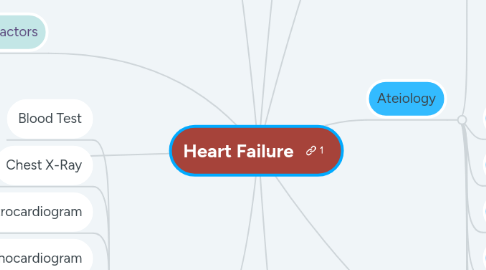
1. Pulmonary Edema
2. Nursing Management
2.1. Nursing Assessment
2.1.1. History Taking
2.1.2. Head to Toe Assessment
2.1.3. Focused Assessment: Cardiac Assessment
2.1.3.1. Inspect
2.1.3.2. Percussion
2.1.3.3. Palpate
2.1.3.4. Auscultation
2.2. Nursing Intervention
2.2.1. Daily Weights
2.2.2. Fluid Balance Chart
2.2.3. Patient Education
2.2.4. Medication Administration
2.2.5. Regular assessment for signs and symptoms
3. Risk Factors
3.1. Hypertension
3.2. Coronary Artery Disease
3.3. Smoking
3.4. Diabetes
4. Diagnosis
4.1. Blood Test
4.2. Chest X-Ray
4.3. ECG-electrocardiogram
4.4. Echocardiogram
4.5. Stress Test
4.6. CT-Scan
4.7. MRI
4.8. Myocardial biopsy
4.9. Coronary Angiogram
5. Manifestation of Symptoms
6. Obesity
7. Pathophysiology
7.1. Decreased Cardiac Out[put
7.2. Decreased Renal perfusion
7.3. Release of Renin/Angiotensin
7.4. Vasoconstriction and Increased vascular volume
7.5. Fluid Overload
8. Ateiology
8.1. Complications
8.1.1. Stroke
8.1.1.1. Low Cardiac Output due to HF
8.1.1.2. Low blood and oxygen
8.1.1.3. Low oxygen to the brain or blockage due to stenosis
8.1.2. Arrhythmia
8.1.2.1. Low cardiac output leads to lack of oxygen in cardiac cells
8.1.2.2. Lack of oxygen in cardiac cells make the cells depolarized which leads to altered impulse formation or altered impulse conduction causing arrhythmia.
8.1.3. Kidney Failure
8.1.3.1. Due to Heart failure there is no enough supply of oxygenated blood in kidney causing congestion of blood in kidneys.
